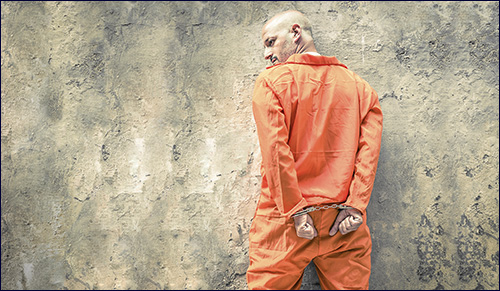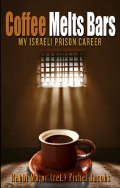 Iran’s Attack on Israel
Iran’s Attack on Israel


8 min read
A mountain of a man, here was a Jew totally ignorant about Judaism willing to risk his life for being Jewish.
The following true story is excerpted from the upcoming book Coffee Melts Bars – My Israeli Prison Career.
Boris, 6' 4", 240 pounds of hulking muscle, in his late forties, stood poised in front of me. He had a huge head set on a broad, powerful, muscular, thick-boned torso. His body did not move when he spoke; he just held you fixed with his steady glare, seemingly ready for a fight. Etched on his face was the intense, ruthless expression of a killer.
How did I meet Boris?
A few years ago, I spent Yom Kippur, the holiest day of the Jewish calendar, in one of my prisons. The idea sprang from necessity. The cantors scheduled to lead the services didn’t show up. There’s a budget for this; officers are not expected to spend their holidays with the prisoners. But no cantors—no services.
So, there I was. My wife, Miriam, packed the traditional knee-length, white gown worn on this day, slippers of man-made material (leather is considered too comfortable to wear on this atonement day), and ram’s horn, blown as a sign of the fast day’s completion.
I arrived at the prison the afternoon preceding the holiday and made sure all the preparations were taken care of. In expectation of larger prisoner participation, the dining hall had been converted into a makeshift synagogue, including the construction of a ‘holy ark’ in which to place the Torah scrolls. The prayer books were in place. The room was orderly and sparkling.
An hour before the holiday began I made my rounds of the cells to wish the inmates an easy fast and a healthy new year.
It was then I met Boris, a mountain of a man, standing there in the middle of his cell, in all his awesome might, dressed only in his underwear.
“Du redtz Yiddish? You speak Yiddish?” he asked, explaining his Hebrew wasn’t too good.
“Yuh,” I answered.
We shook hands. I patted him on the shoulder, gave him a smile.
He warmed up. An inkling of a smile slowly, but only briefly, passed his lips. Nodding, he grunted to the other prisoners, “Er iz beseder, he’s okay.” A pass straight out of a mafia family meeting.
I’m a Jew. And I want everyone to know. Especially, those lousy Russians.
Covering his huge beefy shoulder was a large, eight-by-seven inch tattoo. It depicted an old Jew with a long white beard, wearing a fur hat; kneeling on one knee, he held both ends of a sword horizontally above his head. Resting on top of the sword’s top edge was a large Star of David.
“I’m Russian,” he said.
“Why the tattoo?” I asked.
“I’m a Jew. And I want everyone to know. Especially, those lousy Russians,” he said, then jerked his left arm up from the elbow placing his right fist in the inner part of the bent elbow (the Israeli equivalent of an expletive). “Animals, filth, goyim! (non-Jews)” he muttered, turning the sides of his mouth down in disgust.
“I’m also a Cohen,” he said proudly, making the famous hand sign with which they pronounce blessings.
“Do you know anything about the religion?” I asked.
“Nothing at all.” Then he laughed, a kind of bellowing, raspy blast, with his whole body, a laugh that expressed humor, hidden suffering, fear, and fierce resolution.
His ethnic pride was sincere and refreshing.
Later, during the holiday, I asked him what he did for a living in Russia. Stammering, he muttered, “A gonif, a thief.”
“How long have you been in prisons?”
“In and out,” he said, “for over 27 years.”
I started to get the picture.
“What’s it like in Russian prisons?” I continued. “I heard it’s much harder than elsewhere.”
“The guards aren’t like here,” he said, his body heaving with laughter. Then, suddenly, a cold heaviness shot through his eyes, “Here the guards are human... There not.”
“What was it like?”
“You don’t want to know,” he said slowly, thinking. “They give you dry bread, water, potatoes. That’s all you eat. You’re always hungry. You can’t talk to anyone all day.”
“What did you do to spend time?”
“For years, we broke heavy boulders with huge sledgehammers for eight hours a day. The authorities took these by railroad cars and dumped them into the sea.”
“What?!” I asked disbelieving.
“The imprisonment is to break the spirit. That’s their tactic.”
“Did anyone ever escape?” I asked.
He laughed, belting out that explosive sound. “From Siberia?” Then he remembered. “Once I was in a camp, not far from the cities, a day’s train ride, a week’s walk. My bunkmates escaped. Took a guard with them.”
“Why?” I asked, but knew I shouldn’t.
His body tightened. “For food.”
My stomach turned. I took a deep breath, exhaled slowly.
“How did they look at Jews in prison?” I asked.
Only the strongest survive in Russian prisons, especially when it comes to Jews.
“They don’t,” he said, penetrating me with a look I never saw before, a piercing glance in which I felt a fierce coldness, which could only be connected with death itself. “They kill the weaker ones.”
“Who?”
“Russian thugs. Only the strongest survive in Russian prisons, especially when it comes to Jews.”
“How did you survive all those years with that tattoo in Russian prisons?”
His lips formed a smile his eyes did not. I shuddered.
Here was a Jew, by his own admission totally ignorant of any of his history or inner meaning, yet proud enough to flaunt a huge picture depicting an ethnically defiant theme, a tattoo which, were it not for his size, probably would have gotten him killed.
“Where you ever attacked?”
“Yes,” he said, lifting his shirt, showing me a five inch scar above his kidney.
“What...?”
“One, in front, with a shovel, another behind me with a knife.”
“And...?”
“The one in front, I killed. Then I collapsed. Woke up in the infirmary.”
“Anyone punished?”
A sudden laugh. “In Russian prisons, no one talks. We fight. One wins. One loses. Guards don’t care.”
All during Yom Kippur, Boris kept flashing into my mind. His personality intrigued me.
During the closing services, as customary, I gave a speech. I spoke about the Cantonists in Russia. These were Jewish children, kidnapped by government order for forced military service. The background was a list of laws of unfathomable cruelty enacted between the years 1825-1855, under the regime of Czar Nikolai I. The harshest was the Cantonist law under which Jewish boys were conscripted, at eight years of age, for a twenty-five year service, to the Russian army. With any hint of approaching Russian soldiers, the Jews hastily hid their children. Inevitably, many were kidnapped. The number ran in the tens of thousands.
Many of these captive youth managed to stay together, fearing the worst, practicing whatever they remembered of their religion. Some were beaten mercilessly by their officers. Many died bitter deaths.
Once a group of rabbis came to Petrograd (the capital of Russia) for a convention, asking special permission from the military authorities to spend Yom Kippur with a group of these youths. The request was granted. Approaching the last prayer, Neila (“closing,” referring to the gates of heaven), the rabbis suggested that one of the boys be honored with the concluding opening of the holy ark. The Cantonists unanimously selected one of their group, a quiet eleven year old named Yosef.
The reason for this choice wasn’t apparent, but it would be.
“Open your shirt,” they told him. He did, revealing a mass of deep scars, cuts, and bruises from years of punishment.
Yosef approached the prayer post, opened the ark. With the assembly looking on, he cleared his voice and in a clear calm tone addressed his Maker.
All I ask you, God, is grant me the power this coming year to remain a proud Jew. And to sanctify Your holy Name.
“Almighty. During Neila, Jews pray for gezunt, health, during the coming year. Look at my beaten, broken body. I don’t think of requesting health. Jews pray for wealth. Look at me. Possessing wealth doesn’t even occur to me. Unmarried Jews pray for a mate,” he stopped momentarily, holding back tears, “but who would ever take me, after all that I’ve been through?
“All I ask you, my God, God of my parents and their fathers, is grant me the power this coming year to remain a proud Jew. And to sanctify Your holy Name.”
With this, he began the mourner’s prayer, “Yisgadol yeyiskadosh Shmeh rabbah... Exalted and hallowed be His great Name throughout the world which He created...”
Then, in this most dramatic moment of the Jewish year, the words just came to me. “It’s written, ‘The Almighty wants the heart of man.’ It’s not only our minds, but our hearts the Almighty wants,” I explained.
“I think it would be fitting for Boris to open the ark.” Then, with warm, uncontrollable tears flowing down my cheeks, I invited Boris to honor us by coming up front and opening the holy ark.
Everyone nodded in agreement.
Boris gratefully accepted the invitation, but had no idea why he was being honored.
Excerpted from the upcoming book Coffee Melts Bars – My Israeli Prison Career.
